- Home
- J. Clifton Slater
Uncertain Honor Page 25
Uncertain Honor Read online
Page 25
Not wanting to leave the mad Colonel to the mercy of the Empire troops, Kalem order his section into action, “Forward.”
Philetus hesitated. Tucked in behind their big infantry shields, the Century had weathered attack after attack by the mercenaries with only a few injuries. Now, the Battle Commander and the Sergeant had charged into the soldiers. He didn’t want to risk his men, but Philetus was first squad leader. No, he was a Tesserarius, third in charge of a Century and he would not be embarrassed by a lack of aggression.
“Left flank,” he screamed while forcing his way to the front rank, “attack.”
The Corporal and the twelve Legionaries in his double row leaped forward. Five soldiers died at their hands as they charged. Stumbling over the bodies, they tensed for the next engagement. Except, there wasn’t anyone to fight. The hill in front of them lay deserted. Far down the slope, Philetus saw the mercenaries racing for the mouth of the mountain trail.
***
In the distance, the unmistakable ranks of the third maniple jogged across the valley floor. Their lines arrow straight and their feet coming down in a unified fashion, the veterans of the Legion raced to engage the fleeing forces of the Empire. While witnessing the military precision of the veterans, the men of the Sixth felt the inadequacies of being first maniple creep over them. Breaking the spell, a voice boomed and echoed over the Century.
“Merchants of Mayhem, you are no longer unbloodied,” Alerio bellowed while lifting his red stained blade into the air. “The men of the Sixth are ready to stand in any Legion combat line, in any region of the Republic. And I am proud to say, you are infantrymen of Regulus Legion North. Rah.”
“Rah,” the young infantrymen responded.
“Sir, which section had the most kills,” the doomsayer inquired.
“The center section, of course,” Alerio replied. He glared at the blood splattered Legionaries and asked. “Does anyone dare to challenge a ruling by the Legion’s Battle Commander?”
Act 10
Chapter 28 – Rulings and Regrets
As promised, three cows were herded to Sixth Century. Along with the animals, Hektor went to attend to the wounded, a supply man transported two amphorae of wine, and a priest was dispatched to preside over the generous offerings. As the sacrificial meat would far exceed one Century’s need, the Merchants of Mayhem invited the rest of first maniple and their officers to the festivities.
After the sacrifices and butchering, slabs of meat were put on spits, the fires lit, and men happily shared the task of rotating the beef while sipping wine.
The mood in first maniple’s area was light and full of good will. In the Legion command tent, the mood was anything but festive.
***
Centurion Lophos flinched on every circuit made by the Battle Commander. While the cartographer couldn’t leave his seat at the map table, Tribune Invisum managed to escape. The planning and strategies officer had claimed a spot in the corner of the tent. Around him, Junior Tribunes huddled to stay out of the way of the marauding Battle Commander. Next to the entrance, First Centurion Palle stood watching the Colonel prowl the room.
The angry expression on Alerio’s face, the clenched fists, and the stiff posture weren’t the only evidence of his state of mind. In addition to his attitude, the Colonel still wore the blood-stained armor.
Words from outside announced an arrival, and a heartbeat later, Tribune Ostentus Colonna breezed into the command tent.
“Some of our infantry had a rough time out there,” Ostentus declared. “It must have been…”
The cavalry officer’s eyes adjusted to the dim interior and his chin dropped.
Alerio reached drown and pulled a sack from under the table. He extracted a severed hand and, in three strides, came nose to nose with the Tribune.
“Where was my cavalry escort?” Alerio growled.
He lifted the hand and slapped Colonna’s face with the floppy appendage.
“Where were the horsemen to guard my flanks?” he demanded.
Again, the dead man’s hand smacked the Tribune’s cheek.
“Where were the mounted riders to cover my retreat,” Alerio questioned.
The lifeless hand struck the cavalry officer’s nose. Blood flowed from one nostril.
“Where were your riders?” Alerio asked. “Where were you?”
Everyone in the tent caught their breath when Alerio pulled his Legion dagger. But instead of stabbing the Tribune, he gripped the fingers of the hand and curled them over the blade. With a pull, he cut two fingers off at the knuckles.
“Centurion Lophos,” Alerio called out.
“Here, sir,” the map maker replied.
“Take a clean sheet of parchment and write this down,” he instructed.
“Consul Marcus Atilius Regulus, I trust this letter finds you in good health and of a strong constitution. Enclosed, no doubt, you’ve noticed the gift from the coward Ostentus Colonna. Please note when you see him in a day, I refrained from laying my hands or a blade on him. Although I would be within my rights to crucify him for dereliction of duty.
Do what you will with him. But know he is never to associate with Legion North. If he crosses my path, I will challenge him to a duel and kill him.
I do request a replacement. Perhaps a man this time. One of courage and commitment, a leader fit to command my cavalry.
Alerio Carvilius Sisera, Citizen of the Republic, Colonel of the Legion, and Battel Commander of Regulus Legion North”
Lophos walked the note and a pen over. Once Alerio signed the document, he handed the pen to the Centurion and rolled the fingers in the message.
“First Centurion. Send this to Consul Regulus today,” he directed Palle.
“Right away Colonel,” the Ardent Rabbit assured him. With a nod at Ostentus, he inquired. “What about Tribune Colonna?”
“We’re going to dine together,” Alerio answered. He clapped his hands and servants brought in a table and two chairs. “We’re going to sip vino until dawn.”
“That sounds like a death watch, Colonel Sisera,” Tribune Invisum suggested.
Another servant brought in two sharpened daggers and placed them across the table from each other.
“It’s not,” Alerio offered before tossing the dead man’s hand onto the tabletop. “Unless Colonna decides to pick up his dagger and fight for his honor.”
Alerio took the Tribune’s arm and guided him to a seat at the table. Across from the cavalry officer, Alerio sat and began picking at flakes of dried blood on his armor. One fragment peeled away. Alerio flicked it at Ostentus Colonna. He peeled another off the soiled leather.
With each sliver of dried blood Alerio sent across the table, he begged, “Pick up the dagger, please.”
***
In the Capital of the Empire, they held a different type of debriefing. Rapping with his staff, the floor speaker called the assembly to order.
“Gentlemen of the Special Branch, General Hasdrubal Gisco,” he announced without a welcome greeting.
Hasdrubal marched in, stopped in the center of the witness area, and spun on the members.
“When we reached the Eastern Range, I sent scouts ahead to see if we could advance on the Legion Fort undetected,” he described. “The horsemen returned and reported to their officer. Based on the recommendation of the Captain of Cavalry, I ordered the raiding party to cross the gap. On the far side, we entered a narrow valley.”
“Your report is unclear,” the speaker commented. “Did you attack the invader’s encampment or not?”
“Regrettably, a patrol of Legionaries was there when we came through the pass,” Hasdrubal explained. “The Major of Light Infantry failed to detain them. We attacked but the Republic forces outpaced my cavalry and my soldiers. They reached a prepared fortified position and fended off wave upon wave of my infantry.”
“How much damage did you inflict on the Legion?” the Military Suffete inquired.
“After the delay caused
by the Captain and Major, we encountered a reaction force,” Hasdrubal clarified. “Unfortunately, having only light infantry, I was forced to flee before reaching the Republic stronghold.”
“What are we going to do about the inadequate forces sent by our city states?” a member demanded.
“It’s insufferable the low quality of troops,” another remarked, “and the incompetent commanders we have to deal with.”
“General Gisco, the Special Branch appreciates your personal bravery in leading the raid,” Suffete Paltibaal exclaimed. “Of course, you will join Generals Bostar and Hamilcar in preparing our army. Won’t you?”
“It’s my sworn duty to see the Legions push into the sea,” Hasdrubal declared. “I will join my fellow Generals and do my part.”
Hasdrubal Gisco saluted the members before marching from the amphitheater.
Far in the back of the auditorium and out of sight from the tiers of seating, Spartan Commander Xanthippus put a hand over his mouth to keep from laughing. It was a myth that men from Sparta were humorless. Despite the public face, they enjoyed satire and mockery to its fullest. And having another inept Qart Hadasht General, once again blaming his underlings for a defeat, was hilarious. Except laughing at or criticizing an Empire General was punishable by death. Thus, the Spartan kept his hand in place until the urge to laugh passed.
***
A week later, Legion North had seen no activity at the gap. But just in case the Empire returned, they maintained a two Century presence at the trailhead. Then, the harvest season came and went, and a malaise fell over the camp.
Almost every Legionary took pride in being a farmer. Some from picking rocks so they could till small plots, and others from the experience of managing acres of fertile land. Missing the hard work of the harvest and the gatherings after the crops came in sent the Legion into a state of depression.
Alerio, his combat officers, and NCOs knew how to adjust attitudes. But they were limited on how much they could push the Legionaries. On any day, General Regulus might order them to break camp and march towards the Qart Hadasht Capital. When the order came, Alerio needed his Centuries fresh, not beaten into the ground by exercises meant to alter their mood.
***
Battle Commander Sisera fingered the Helios pendant that hung around his neck. He thought of Gabriella for a moment before dropping the medal of the Sun God under his tunic. On either side of the banquet table, the command staff for Legion North drank and talked. When they noticed their Colonel staring at them, they ended the conversations and faced him.
“On this day of Demeter, I thank you for being here with me,” he declared while standing. “Like you, I would have rather been home for the harvest. But like you, I serve where the Republic needs me. To you, I say Euge.”
“When will we be going home, sir?” Centurion Lophos asked.
“Not before we lop off a thousand Qart Hadasht heads,” Rapti Galba declared.
The new Tribune of Cavalry had proven his commitment by increasing the number of horse patrols and working with the infantry to sharpen the reaction time of both.
“I received word from General Regulus that we’ll soon push through the pass and move in force towards the Empire’s Capital,” Alerio informed them. “If the Gods will it, we’ll capture Qart Hadasht and be sailing for home before the Consul’s term is over on the Ides of March.”
“To Demeter the Goddess of the Harvest,” Senior Tribune Emerens suggested. “May she care for our farmland while we’re away,”
“Rah,” Alerio declared.
The staff drank to the harvest Goddess and most thought of being home by March. Except for Centurion Lophos. With the aroma of beef, bread, and bird in the air, his visions were of stuffing his face and filling his belly.
***
Twenty-five miles away in Kelibia, Consul/General Marcus Regulus sat by himself. Thoughts of Marcia and his children danced across his mind as he remembered last year’s feast of Demeter.
The memories brought a smile to his face until a knock on the door broke the whimsey.
“Come in,” he directed.
“Sir, the celebration of Demeter is about to get underway. Your presence is important for honoring the Goddess of the Harvest,” the aide-de-camp reminded him. Almost as an afterthought, the staff officer handed Marcus a message. “This came in by ship, sir, only moments ago.”
It had the seal of the Senate and Marcus almost left it for the morning. But duty came before a feast, so Marcus opened the missive. He read it, crumbled the papyrus, and hurled the pieces against a wall. Without a word, Consul Regulus marched from the room.
Out of curiosity, the aide put some pieces together and read a few lines.
…to maintain the command structure, Marcus Atilius Regulus is designated, after his term as Consul of Rome is completed, as Proconsul General for the Punic Expedition.
…considering the complaints received by the Senate, the fleet is being recalled so the one hundred thousand rowers and sailors can be home in time for next year’s planting season…
The aide-de-camp to Consul Regulus let the pieces of reed paper fall from his hand. His stomach soured from the knowledge that the Legions would not be home by the Ides of March. How could they? There wouldn’t be a fleet to ferry them from the Punic shore to a Republic port until next summer.
The End
A note from J. Clifton Slater
You and I have had a long journey with Alerio Sisera. With Uncertain Honor, the 16th book in the series, we have watched him grow from an undersized boy to a battle tested commander. Hopefully, along the way, you have enjoyed the adventures and learned a few things about ancient Rome in the mid-Republic era. I know, I have.
Marriage and divorce in the era were not state sanctioned. A couple didn’t need a license to wed. But the use of ten witnesses to a wedding was a nod to civil law and property settlements if the marriage failed. Many of the practices of the ceremony were to honor the Gods and Goddesses that influenced the marital union. We started Uncertain Honor with a wedding between Alerio and the beautiful Gabriella as they paid homage to ancient customs.
Later in the book, the topic of divorce came up in the story. The laws and traditions for each were researched to hold as true to historical facts as possible. What I didn’t delve into were the strong patriarch controls and the use of marriages to consolidate power and wealth between upper class families. Although those were touched on when Alerio was adopted by Senator Spurius Maximus in book #12, Muted Implications.
The Siege of Syracuse in 278 B.C. was the last attempt by the Carthaginian Empire to capture Syracuse. Although 22 years before the events in this book, the attempted takeover shows the long-standing aggression of Carthage and the fierce independence of the people of Syracuse.
Carthage, until 146 B.C., was ruled by two Suffetes. Elected by an assembly, the Suffetes ran the Empire with one handling domestic and commercial affairs. The other Suffete delt with military matters. One thing I found interesting was the problem Carthage had with their Generals in far off posts. Many set themselves up like Kings. To keep their military leaders in check, the military Suffete had a ‘Special Branch’ with 104 members. They ruled over misconduct and deeds by their Generals, including executions for offensives, and rewards for successes.
I used ship designations referring to the way rowers were stacked. A 3-banker was a trireme with three oars manned by three oarsmen. The warship had 170 oars, one for each oarsman. For the 5-bankers, the quinqueremes, they stacked five oarsmen by double manning two oars with a signal oar having one oarsman. The larger warships boasted 180 oars with 300 rowers. During the 1st Punic War, the Roman oarsmen were not slaves, but paid professionals. Probably recruited from towns and from tribes neighboring the Republic territory.
The Cartage fleet used the same types of ships as the Romans and the Greeks. Except for the Isle of Rhodes, all the naval powers in the Mediterranean Sea of that era had the same variety of warships. Although, s
ome were of heavier construction like the Roman Fleet.
Historian Polybius, 200 B.C. - 117 B.C. did not record Hamilcar’s speech to the Carthage fleet before the Battle of Cape Ecnomus. He did report that the rowers and soldiers enthusiastically embraced the General’s message. From his writings in ‘Histories’, Polybius tells us Hamilcar and Hanno commanded an Empire fleet with 412 warships and 150,000 men. Defending against the Carthage fleet were Consuls Longus and Regulus commanding 330 Roman warships with 140,000 men.
I took exception to Polybius wherein he wrote the Roman fleet only used barges for horses and supplies. In my estimation, 140,000 men would eat about 126 tons of grain a day based on the standard Legion ration. Even buying grain at ports-of-calls, the Roman fleet needed to have grain haulers. Plus, overloading the 5-bankers with heavy infantrymen for the transit made for slow loading of 330 warships every morning. And how were the thousands of light infantrymen transported? In Uncertain Honor, I included supply vessels, grain haulers, and transports for troops and livestock.
Polybius also described the overall tactics, the general events of the sea battle, and the final tally of destruction. These are presented in the story as the historian recorded them. The scenes of the battle were my way of filling in the details within the historian’s framework.
A final note on the Battle of Cape Ecnomus. Historians argue the battle is the largest naval engagement based on numbers of combatants. While modern tonnage outweighs the ancient quinqueremes, it’s hard to argue against a sea battle involving 290,000 oarsmen, sailors, officers, and infantrymen as not being the largest.
Per the research, the first fighting on the Punic coast started with the Siege of Aspis. In the city of Kelibia on the coast of modern-day Tunisia, there is a Fort Kelibia that is visible on maps. Hopefully, my description of the plan to take the fort makes sense. By land, Kelibia is only 72 miles around the Bay of Tunis to the site of ancient Carthage.

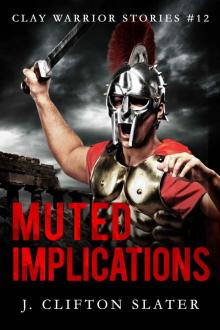 Muted Implications (Clay Warrior Stories Book 12)
Muted Implications (Clay Warrior Stories Book 12)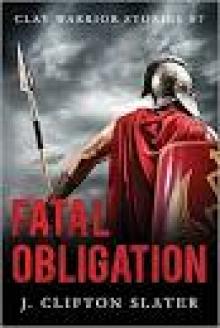 Fatal Obligation
Fatal Obligation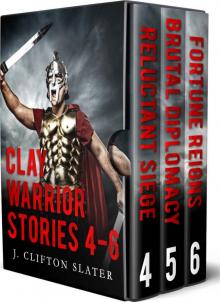 Clay Warrior Stories Boxset 2
Clay Warrior Stories Boxset 2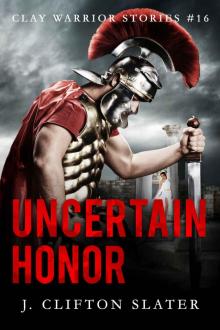 Uncertain Honor
Uncertain Honor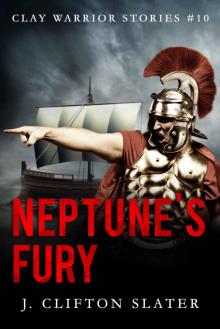 Neptune's Fury
Neptune's Fury Fortune Reigns
Fortune Reigns Op File Treason
Op File Treason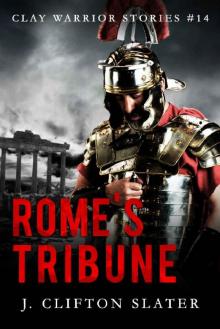 Rome's Tribune (Clay Warrior Stories Book 14)
Rome's Tribune (Clay Warrior Stories Book 14) Clay Warrior Stories Boxset 1
Clay Warrior Stories Boxset 1 Serpent Circles
Serpent Circles Reluctant Siege
Reluctant Siege Infinite Courage
Infinite Courage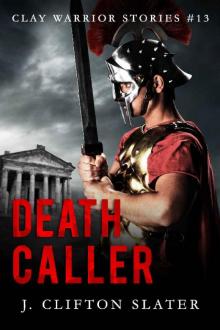 Death Caller (Clay Warrior Stories Book 13)
Death Caller (Clay Warrior Stories Book 13) Op File Sanction
Op File Sanction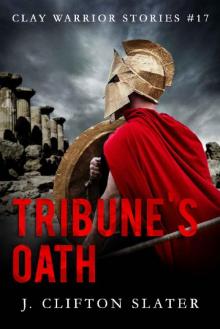 Tribune's Oath (Clay Warrior Stories Book 17)
Tribune's Oath (Clay Warrior Stories Book 17) Galactic Council Realm 1: On Station
Galactic Council Realm 1: On Station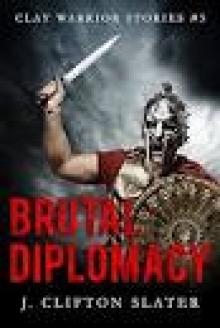 Brutal Diplomacy
Brutal Diplomacy Op File Revenge
Op File Revenge On Point
On Point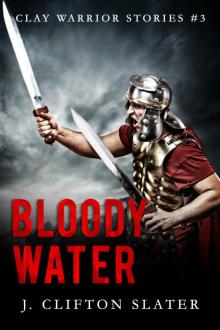 Bloody Water (Clay Warrior Stories Book 3)
Bloody Water (Clay Warrior Stories Book 3) Galactic Council Realm 2: On Duty
Galactic Council Realm 2: On Duty Galactic Council Realm 3: On Guard
Galactic Council Realm 3: On Guard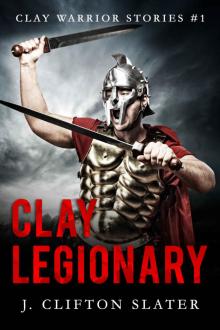 Clay Legionary (Clay Warrior Stories Book 1)
Clay Legionary (Clay Warrior Stories Book 1) On Point (Galactic Council Realm Book 4)
On Point (Galactic Council Realm Book 4) Op File Revenge (Call Sign Warlock Book 1)
Op File Revenge (Call Sign Warlock Book 1)